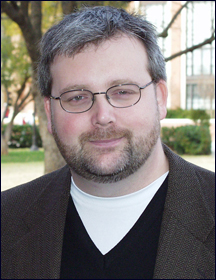$700,000 grant enables OSU researcher to study first responder creativity
Wednesday, January 24, 2007

An Oklahoma State University researcher will help lead a national study on the emergency responses following 9/11 and the Oklahoma City bombing.
These unprecedented American disasters forced first responders to make decisions based on their instincts as much as on standard procedures and training.
Gary Webb, associate professor of sociology, is a co-principal investigator on the project examining how first responders used creativity, flexibility and improvisation in the wake of terrorist attacks on the World Trade Center and Oklahoma City’s Alfred P. Murrah Federal Building.
Webb and his collaborators, David Mendonca from the New Jersey Institute of Technology and Carter Butts from the University of California-Irvine have received a $700,000 grant from the National Science Foundation to complete the study.
According to Webb, the rescue and recovery efforts during the 9/11 and Oklahoma City bombing disasters challenged first responders in ways that exceeded all standard disaster management plans. The training and previous experiences of the hundreds of men and women on site were factors. Still, the emergency responses were effectively conducted because hundreds of people could find solutions to unforeseeable problems.
“These disasters happened so quickly and on such a scale that first responders had to solve problems without much of a plan — in effect, they were facing situations never before seen,” Webb said. “What we want to know is how people behave when plans don’t work.”
The researchers will analyze archival data such as communication and transcript logs provided by the Oklahoma City bombing memorial and WTC memorial groups. While Mendonca and Butts will focus on the cognitive and network dimensions of improvisation, Webb will study the actual behaviors first responders engage in to solve disaster-induced problems.
"Human beings are resilient in the face of disasters not only because of their ability to plan but also as a result of their ability to adapt,” Webb said. “A major goal of this research is to better understand how human ingenuity and creativity can be channeled toward more effective disaster responses in the future."
Webb is a researcher with OSU’s Center for the Study of Disasters and Extreme Events. The interdisciplinary center fosters research seeking to improve disaster recovery and response methods.
